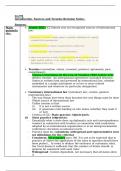LL278
Introduction, Sources and Treaties Revision Notes:
Sources:
Main Article 38(1) ICJ Statute sets out recognised sources of international
points/fa law:
cts:
Treaties (convention, statue, covenant, protocol, agreement, pact,
commitment):
- Vienna Convention on the Law of Treaties 1969 Article 2(2)
defines treaties: ‘An international agreement concluded between
States in written form and governed by international law, whether
embodied in a single instrument or in two or more related
instruments and whatever its particular designation’.
Customary international law (customary law, custom, general
international law):
- The way things have been done becomes the way things must be done
- Oldest source of international law
- Unlike treaties in that
(i) It is not a written source
(ii) It generates rules binding on ALL states (whether they want it
or not)
- Criteria of CIL: State practice, Opinio Juris:
(i) State practice (objective):
- Essentially what a state does; eg diplomatic acts and correspondence;
conduct in connection with treaties; in connection with resolutions
adopted by an international organisation or at an intergovernmental
conference; decisions on national courts
- Practice must be: consistent, widespread and representative (not
set definitions for the criteria):
- Consistent: Nicaraguara para 186 ‘It is not to be expected that in
practice of States the application of the rules in question should have
been perfect… In order to deduce the existence of customary rules,
the Court deems it sufficient that the conduct of States should, in
general, be consistent with such rules’
- Widespread: Context dependent, not necessary that all states show
it
, - In Nicaragua, it was confirmed that ‘If a State acts in a way prima
facie incompatible with a recognised rules but defends its conduct by
appealing to exceptions or justifications contained within the rule
itself…the significance of that attitude is to confirm rather than to
weaken the rule’ – essentially, States can breach custom and it
remains custom
- No particular duration of a practice is required
(ii) Opinio juris (subjective):
- Subjective/psychological element – what a State believes
- The State practice in question is undertaken with a sense of legal
right or obligation
- Opinio juris could be found in public statements at multilateral
conferences, pleadings before international courts and tribunals,
official publications, government legal opinions, diplomatic
correspondence, decisions of national courts, treaty provisions
(iii) Exceptions to universality of CIL:
- So if state practice and opinion juris is found, CIL is to be binding on
all states, unless:
- Bilateral/regional custom says otherwise: eg Right of Passage
Over Indian Territory ICJ case ‘no reason why long continued
practice between the two states accepted by them as regulating their
relations should not form the basis of mutual rights and obligations
between the two states’
- Persistent objector: A state which has always opposed to the
custom in question/opposed to applying it
(iv) Jus cogens:
- A very special type of custom from which no derogation is ever
permitted; any laws conflicting with jus cogens norms should be
considered null and void
- Eg slavery, torture, genocide, crimes against humanity
- All jus cogens are customary international law through adoption by
states, but not all customary international laws rise to level of jus
cogens
Advantages of CIL Disadvantages of CIL
Safeguarding function: Existence of Non-state actors
custom always guarantees a
minimum content to international law
Refresh function: Allows for Lack of democratic legitimacy -
continuous updating of international states with more resources, there
law through changing customs actions are likely to be more readily
identifiable as opposed to smaller
states who don’t have as great an
influence
Constitutionalising function: Custom No proper criteria – vague
is where the foundations of
international law can be found
Universalising function: A formidable Joyner: Without an institutionalized
argumentative tool by virtue of which or agreed process for the creation of
international lawyers universalise CIL through the subjective
, almost any legal claim manifestations of states, the idea of
basing CIL identification primarily on
the opinio juris element is too
susceptible to methodological
highjacking for instrumentalist
purposes. Again, a few recitations of
the provisions of General Assembly
resolutions, a U.N. Human Rights
Committee working group report,
and an article by a scholar reporting
strong state support for a principle,
and voilà!, we have a new rule of CIL
General Principles:
- Principles recognised by community of nations, comprising:
1) Principles derived from national legal systems eg separate legal
personality for corporations
2) Principles formed within the international legal system eg lex
specialis (special rule prevails over general)
Judicial decisions and teachings:
- Decisions of ICJ, domestic courts, other international courts and
tribunals
- Teachings of highly qualified publicists cited in litigating states’
pleadings, arbitral tribunals in awards, international criminal
tribunals in judgments, individual judges in dissenting/separate
opinions
Problem 1 with sources: Weight Misrepresentation
- General principles are part of the general list, whereas judicial
decisions are only seen as ‘a subsidiary means for the determination
of rules of law
Problem 2: Other sources are omitted
- UN General Assembly resolutions; they can reflect state practice,
opinion juris or resolutions can become treaties or encourage states
to ratify treaties
- UN Security Council resolutions; They can have legal force eg Article
25 UN Charter says members of UN agree to accept and carry out
decisions of Security Council
- Unilateral statements
Core Readings:
Jean d’Aspremont Modern 2-element doctrine of CIL (state practice and
‘The Decay of opinion juris) has proved unwieldy for practitioners and
Modern CIL in Spite difficult to conceptualise for scholars – this explains
of Scholarly why international lawyers have been striving to justify
Heroism’ 2015 and improve the doctrine




